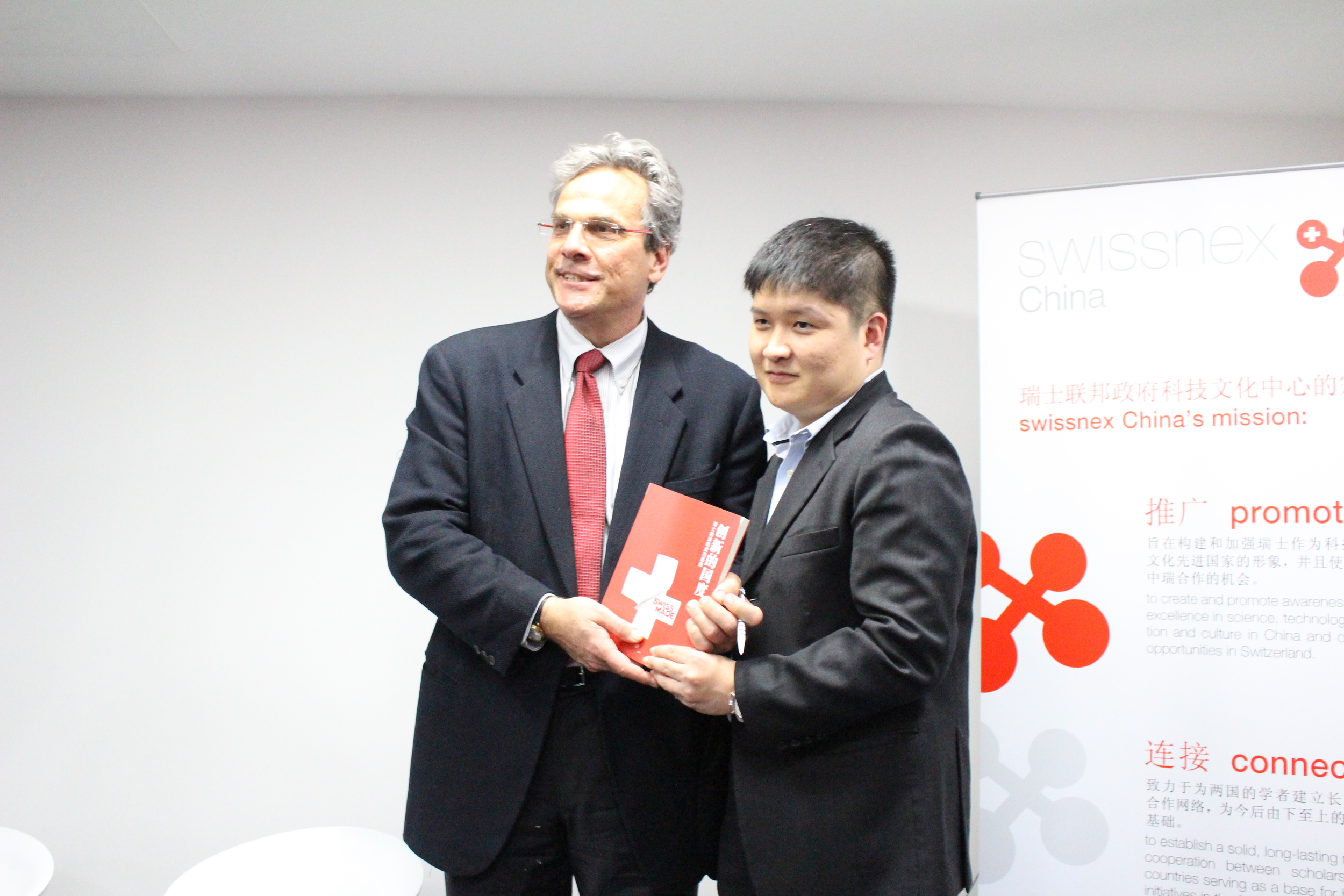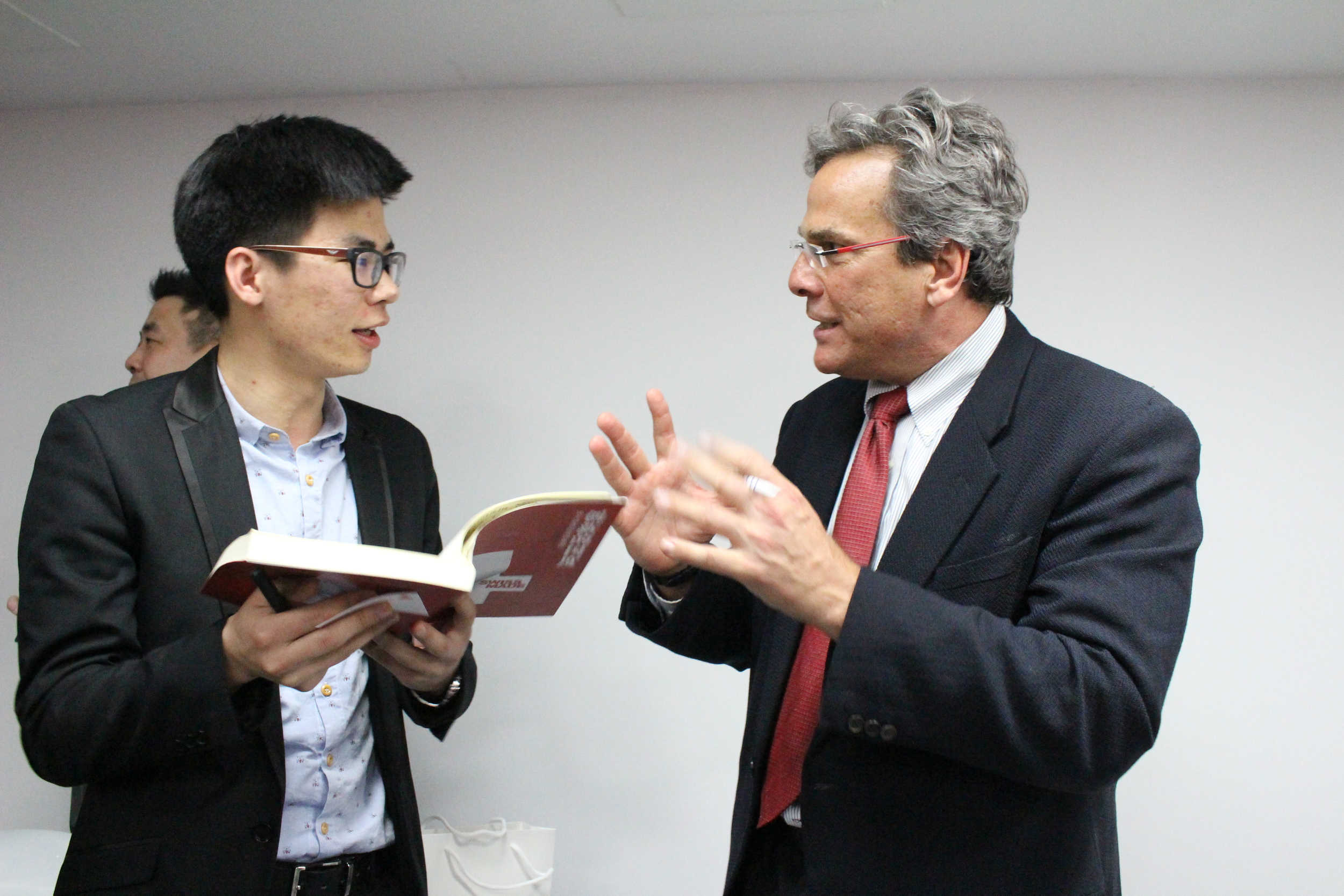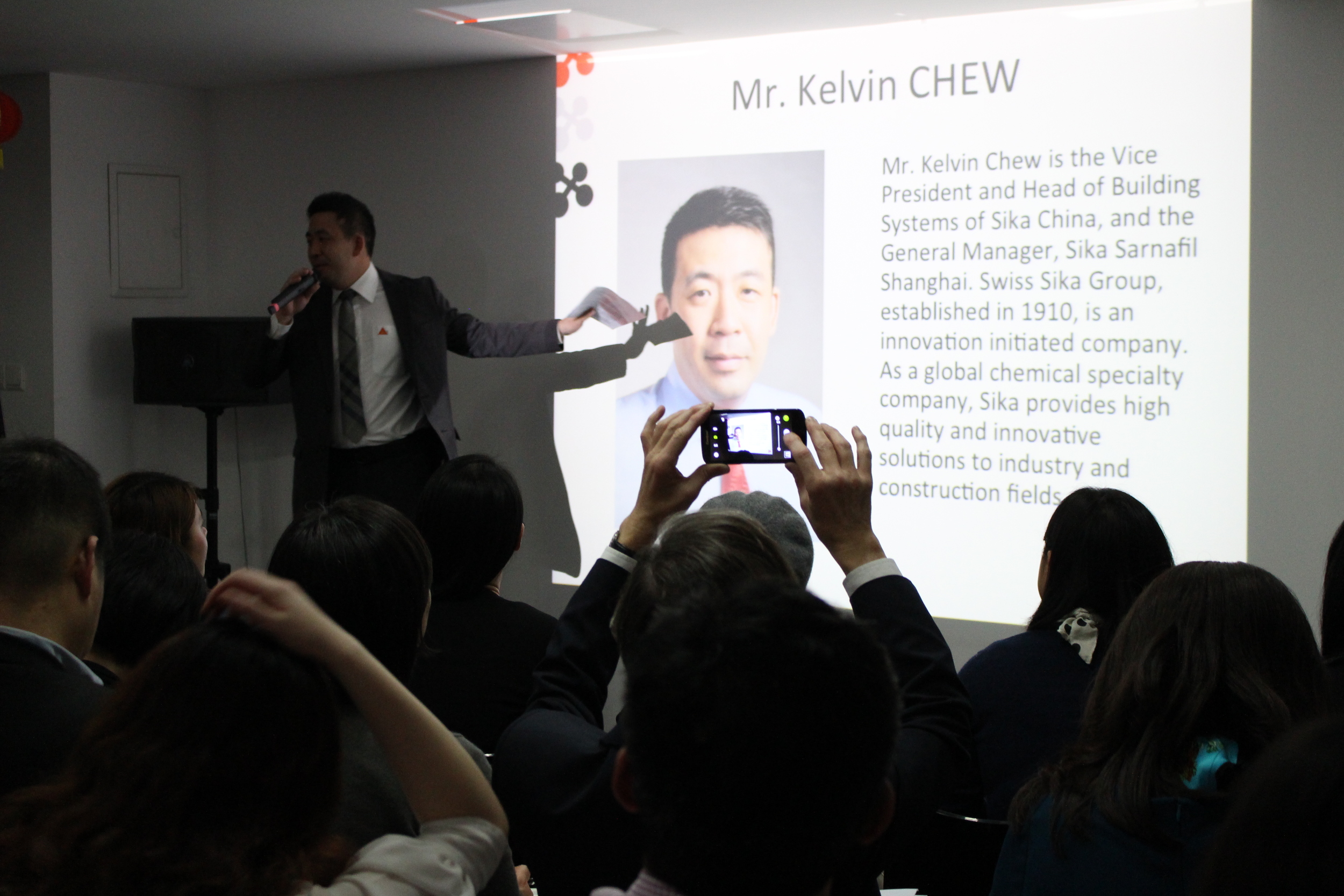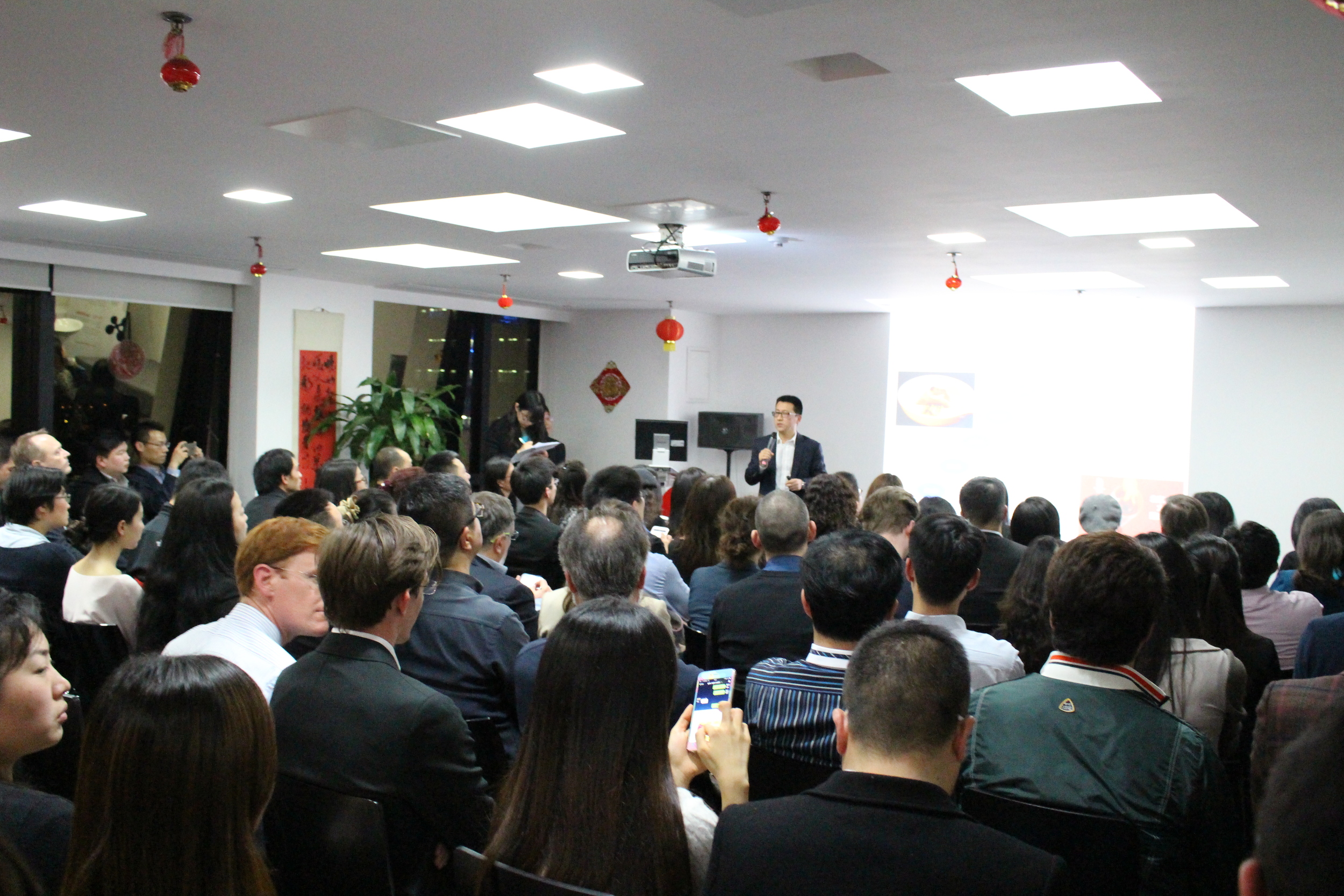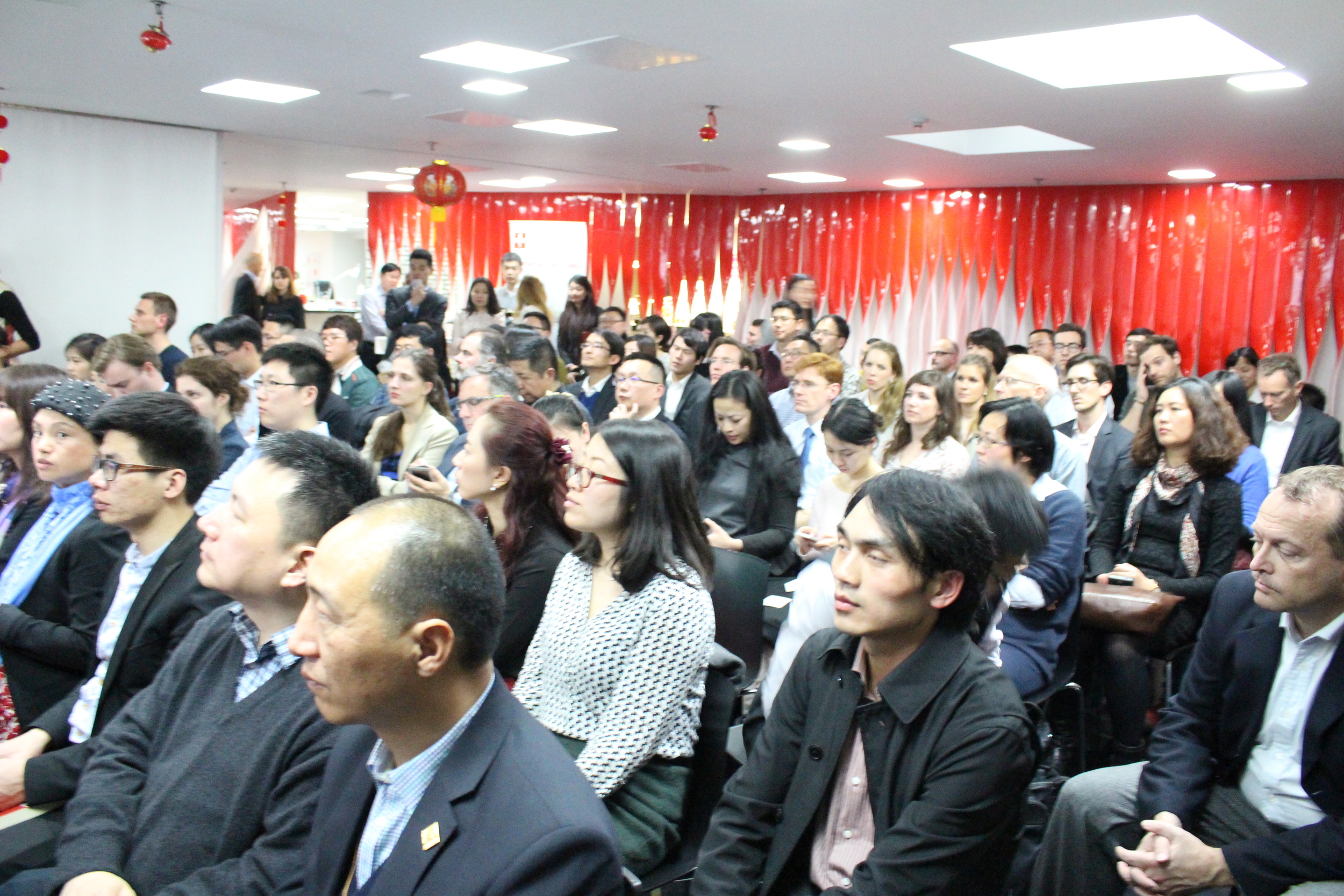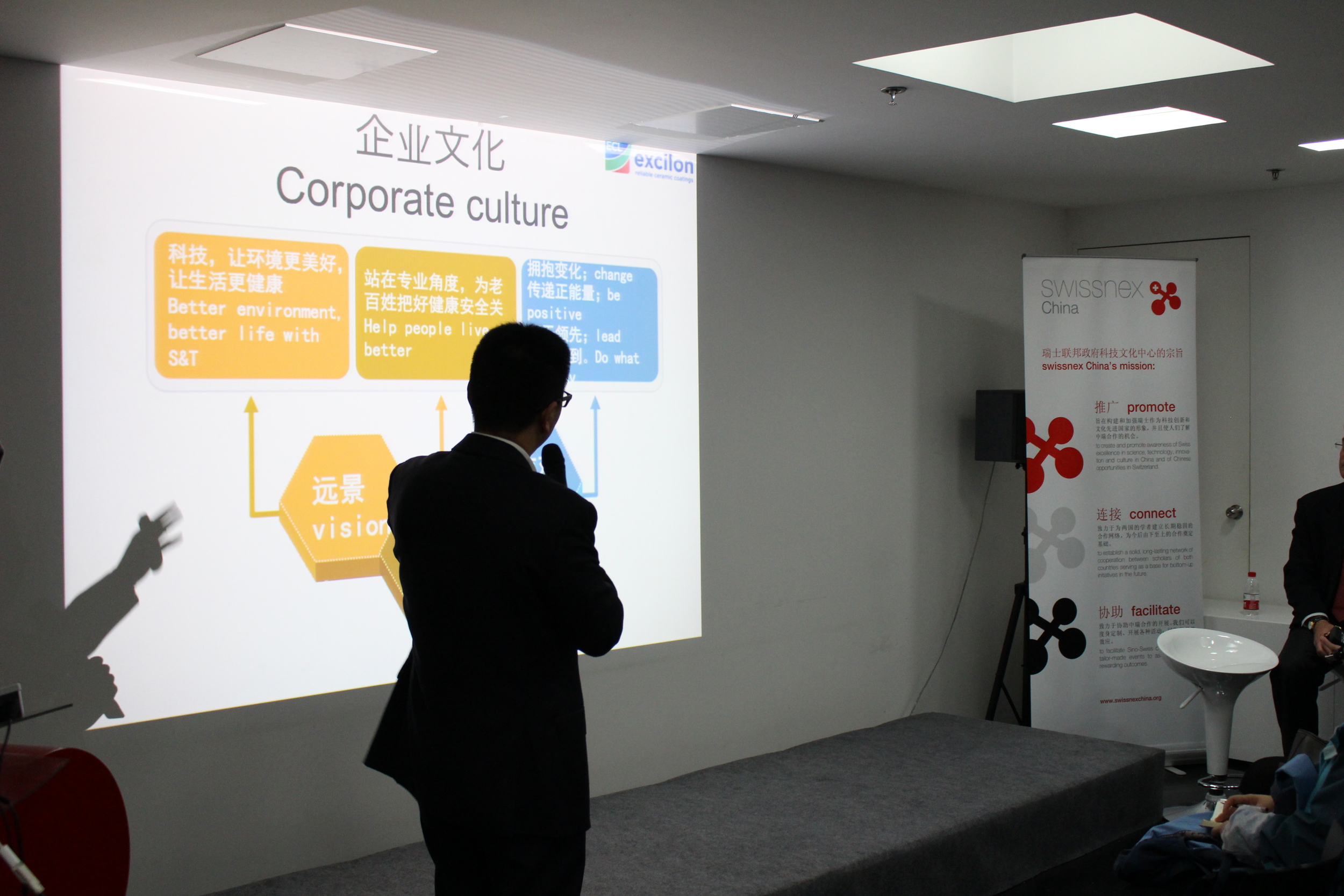This year the Global Pitchfest, organised by swissnex China and venturelab, took place at breakfast time in Gemma restaurant where you can eat one of the fanciest breakfasts in Shanghai; but even the most mouth-watering breakfast ever could not have taken the spotlight away from the 22 impressive start-ups competing this year.
Read Moreventure leaders China 2015
This year’s edition of venture leaders China stood once again in the spotlight of 10 innovative Swiss entrepreneurs, starting in Beijing with an intensive three-days program involving various business experts, entrepreneurs and investors.
Read MoreCapital Risque, Innovation et Startup en Chine
This conference has been organized by the “Section romande de la Société Suisse-Chine” in collaboration with the “Chambre de commerce Suisse-Chine, Section romande”, with the support of swissnex China.
Read More65th Anniversary at the Embassy in Beijing
The Ambassador of Switzerland to China, Mr. Jean-Jacques de Dardel, invited us on September 14 to celebrate the 65th Anniversary of bilateral relations between Switzerland and the People's Republic of China.
Read MoreYoung Swiss entrepreneurs in China: Let’s meet!
swissnex China organized an entrepreneur meeting on the occasion of the Swiss national day, on Saturday 1st of August.
Read MoreA sneak peek into the China Hardware Innovation Camp in Shenzhen
The China Hardware Innovation Camp (CHIC) is a project initiated by Dr. Marc Laperrouza together with Alex Wayenberg and Pascal Marmier.
Read MoreYoung Swiss Challenge: Entrepreneurship Workshop
On July 2, swissnex China organized a joint workshop with Young Swiss in China. The topic?... Entrepreneurship!
Read MoreA Rendezvous between European SMEs and Chinese leading firms – with the visit of the CBP from Basel
This year, the 3rd edition of the Sino-Euro BioPartnering, held in May, welcomed more than 300 participants.
Read MoreHong Kong, where ambitions rise higher than the tallest skyscrapers
From its traditional Kowloon markets to its luxury alleys of Central, Hong Kong is the theatre of constant development. At the feet of the biggest army of skyscrapers in the world, the streets witness millions of transactions every day, in which Swiss companies have a very big part to play.
Read MoreChina’s Tech Start-up Boom
China has the second largest consumer market in the world. Its population of 1.35 billion, of which more than 50% live in urban areas, will generate an estimated GDP growth of approximately 7% over the next 10 years.
Read MoreWhen “Swiss Made” Meets “Made in China”
While “Swiss Made” is considered the symbol of quality and even luxury, “Made in China” is much more controversial. When “Swiss Made” meets “Made in China”, the spark of innovation is generated. To trigger that spark, swissnex China, together with Swiss Cham, Shanghai Swiss Center and Newhuadu Business School (NBS) invited Mr. James Breiding, author of the book Swiss Made: The Untold Story behind Switzerland’s Success, Mr. Lifeng LI, chairman of Shanghai Excilon New Materials Co.,Ltd and Mr. Kelvin CHEW, Vice President and Head of Building Systems of Sika China, General Manager of Sika Sarnafil Shanghai , to share with the audience their experience and stories of doing business in China.
The event was held at the swissnex China office, and attracted a large audience. The registration system was even forced to close early because people registered for the event quickly outnumbered the seats available at the site.
The event started with a welcome speech by Mr. Pascal Marmier, CEO of swissnex China and Vice Consul General of Switzerland in Shanghai. Then Dr. Lifeng LI shared with the audience his story of starting his own business in China, and how he developed his business into a leading company in the industry. He also shared with the audience his understanding of the “New Normal” in China, and his advice for business to survive and thrive in China under the “New Normal”. Then, Mr. James Breiding introduced the development history of Swiss companies, with fascinating success stories of some of the world’s best-selling brands. After Mr. Breiding’s speech, Mr. Kelvin CHEW generously shared his experience of how to manage a Swiss company in China, how they learnt from their failure, and how to constantly innovate to eventually make Sika China a great success.
Following the speeches is a panel discussion and a Q&A session moderated by Dr. Prof. LIN Hua, Vice Dean of NBS and Executive Dean of NBS Switzerland, which provided a golden opportunity for business starters and interested students to consult and to exchange ideas. And as always, with words from the wise to serve your minds, we still hoped to provide something that can give you a great appetite. Delicacies were prepared and the guests were served with good wine.
The event on March 17th is the first of a series of lectures on “Swiss Made and Swiss Innovation”. A seminar has also been held at Antai College of Economics & Management–Shanghai Jiao Tong University on March 18th, where Mr. Breiding delivered a lecture on the Swiss method of Innovation and how it differs from Silicon Valley. Followed by a Q&A, the class, which included several international students, had the opportunity to question Mr. Breiding on both his work and personal life.
- Contributed by Joy Zhao, Junior Project Leader Academic Affairs
Innovation in China: Fast Times and Faster Companies
On March 4, the swissnex China Beijing office within the Embassy of Switzerland co-organized a panel discussion on Innovation in China with the title Fast Times and Faster Companies, hosted by Swiss Ambassador H.E. Jean-Jacques de Dardel. The exclusive event, which generated a huge interest among the Beijing start-up community – exceeding the seating capacity by six fold – has welcomed distinguished speakers and tech-savvy guests for a lively exchange on the latest developments within China’s start-up and technology scene. The moderated talk by Andy Mok, co-organizer and Managing Director of Red Pagoda Resources, was joined by:
- Julie Makinen, Fast Company contributor & Beijing correspondent for the Los Angeles Times
- Dr. Zhang Yusheng, CEO & founder of Apricot Forest (2nd most innovative company in China)
- Frances Du, Director of Microsoft Ventures in the Greater China Region
- Jason Zhao, Vice President at Kleiner Perkins Caufield & Byers China, and
- Olivier Glauser, Co-founder and CFO of Shankai Sports
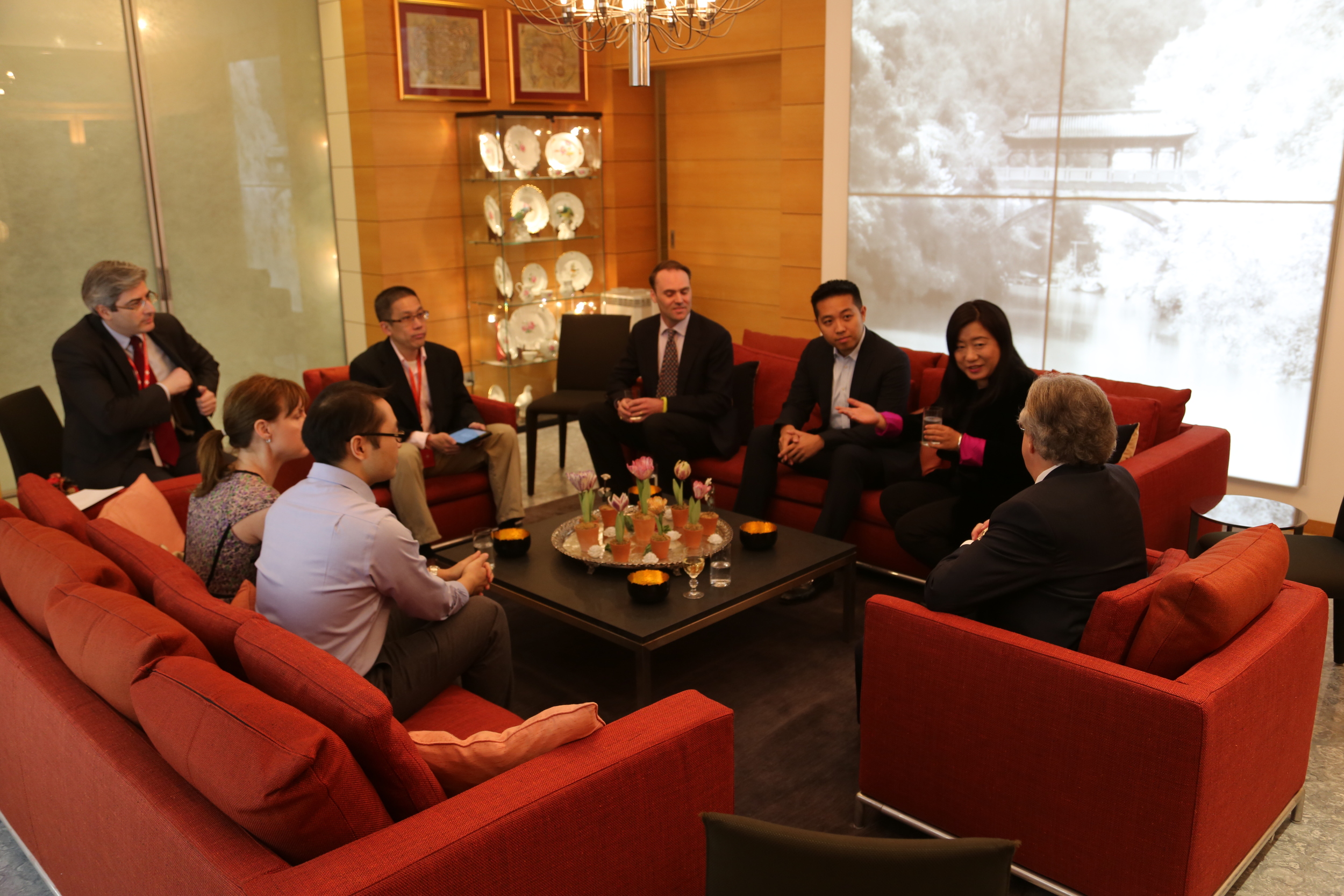
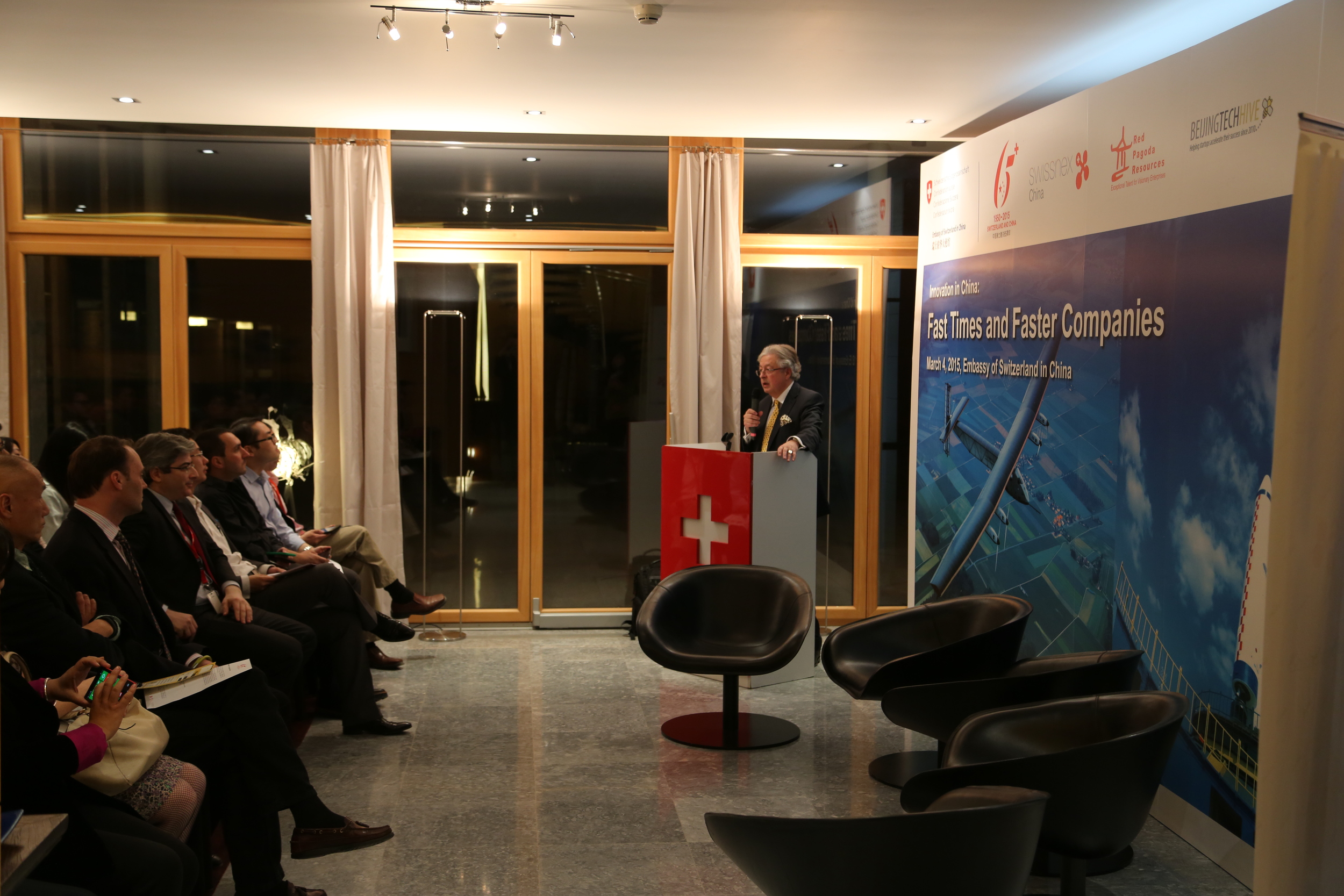
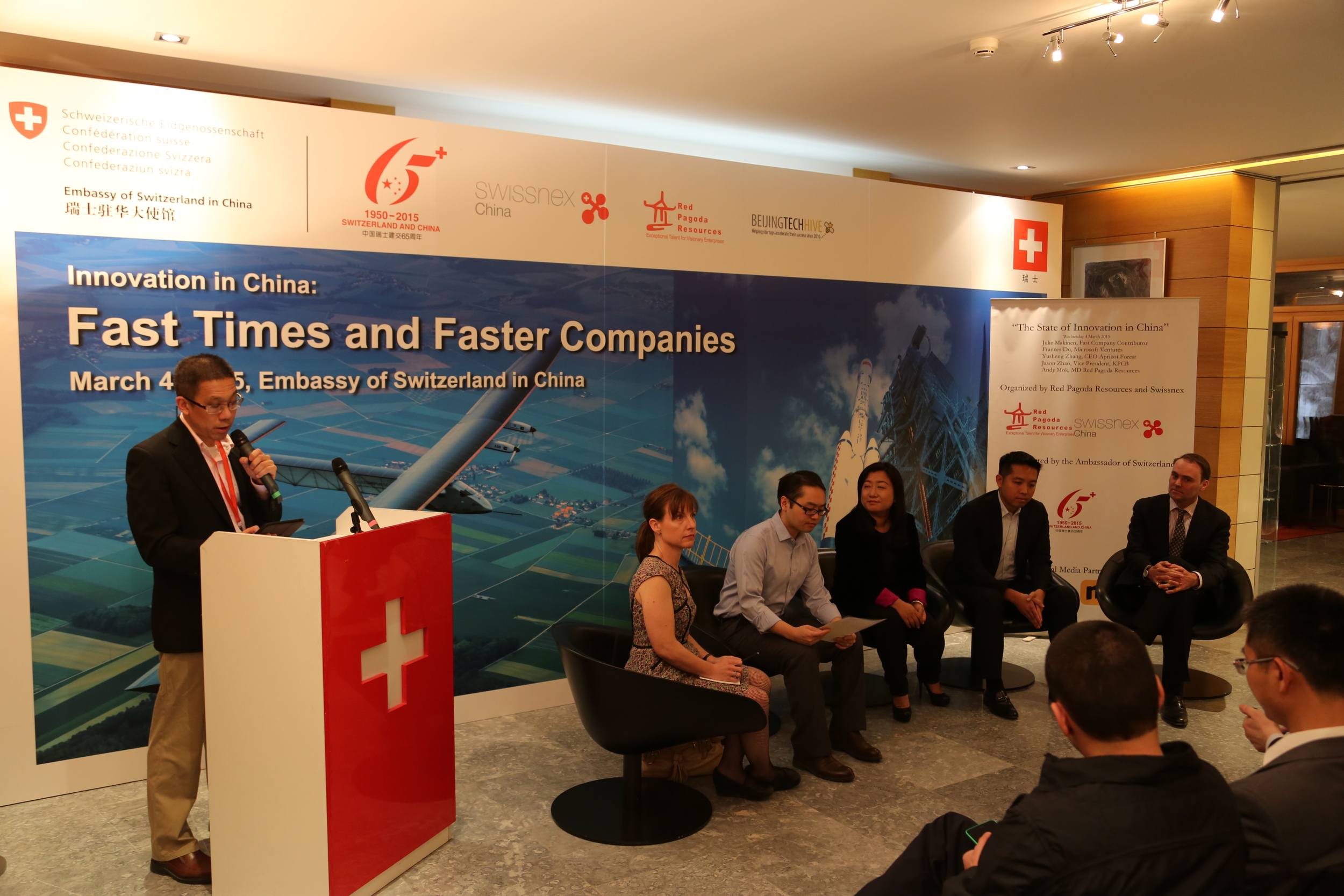
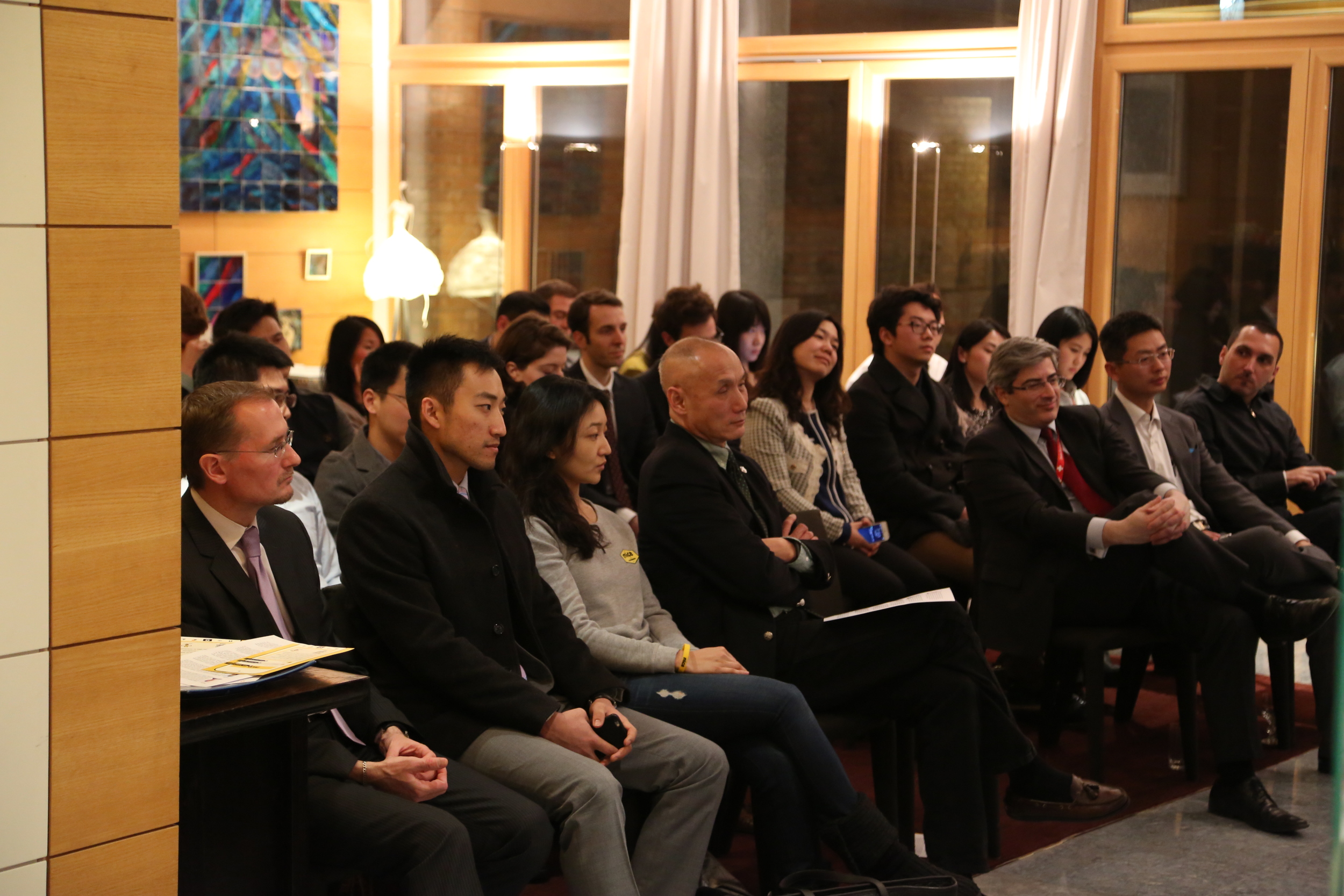


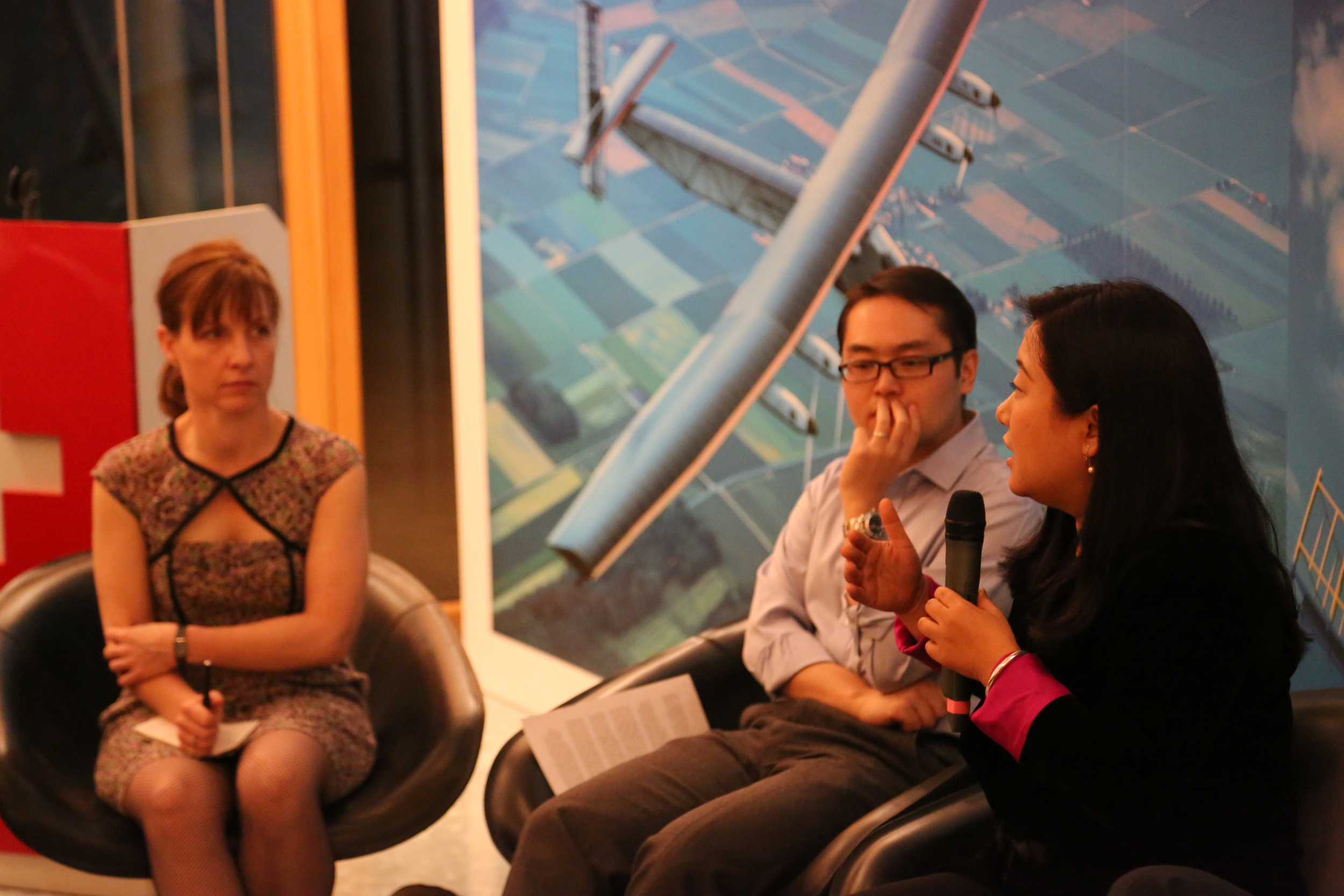
The panel discussion highlighted that innovation is a term, which continuously innovates itself. It strongly relies on social structures, educational institutions, government policies, technologies and their accessibility. A fast moving world requires faster moving companies, able to anticipate and dynamically act to developments in both the near and far future, and to pursue the aim of continuously improving people’s lives or create value within a society. While some critics may argue that China does not innovate particularly well, others like Mrs. Makinen state that China is about to change and to take the lead in innovation. She approaches innovation with an emphasis on technology, accentuating that the access to advanced equipment in, for instance, a hospital, may significantly raise the efficiency of medical doctors dedicating their lives to curing diseases and injuries. Hospitals, unlike humans, act in an institutionalized way, and organizational structures may vary from one place or country to another. It is therefore crucial to engage with new scenarios and domestic institutions in order for a foreign startup or established company to become successful in an unfamiliar market. In a broader sense, the innovative challenge lies not in simply supplying an innovative product to a new market, but rather in a company’s adaptability and willingness to appropriate technologies to a changing context. TradeHero is a perfect example of a foreign startup company based in Singapore, which has gained a strong foothold in China through the customized implementation of innovative technologies, and has achieved to record a remarkable success.
According to Dr. Zhang, innovation starts with caring about an existing problem or discrepancy. In fact, to increase simplicity and make technology cheaper, hence more accessible to the general public, enables changes, creates new opportunities, and facilitates innovative processes. In Du’s opinion, China is currently experiencing exceptional rates of developments in these fields and, as a consequence, is taking big and fast steps in speeding up innovation. Building up on these arguments, Mr. Zhao believes that new technologies now only allow new forms of discoveries, but also strengthen either financial or social networks, again attracting successful foreign companies to major investments in China. As a Swiss representative of visionary entrepreneurs and investors, Mr. Glauser actually made a start-up sports company greatly successful in China. However, he clearly differentiates between technology and innovation, and treats them as two separate entities. In his particular case, Mr. Glauser ingeniously connects the strength of Swiss sports innovation with new Chinese market opportunities. As highly ambitious Swiss projects like the Solar Impulse also show, Switzerland offers Excellency in technology in a relatively small market. China, on the other hand, impresses with a huge market, although its technology standards might still have strong potential for growth. With reference to Mr. Glauser’s success, pairing the two spheres could in fact result in unleashing new and powerful innovative ideas.
In this spirit, the Embassy of Switzerland and swissnex China once again commemorate the 65th Anniversary of the establishment of bilateral relations between Switzerland and China, and promote commitment to research, development, sciences, and technologies all over the world for the benefit of the people and society.
- Contributed by Marcel Schneider, Attaché of Science, Technology and Education Section, Embassy of Switzerland in Beijing
Israel Tech are Looking to the East
Israel and China are becoming a close collaborative couple in the tech industry. Chinese entrepreneurs admire the technology innovations Israel has achieved and China is an ideal market for Israel companies to expand beyond their borders.
Israel has invested considerably in China to establish a network facilitating the tech collaboration and entrepreneurial activities. For example, IP Bank-China was created in 2010 in Suzhou under the auspices of the Infinity Group, an Israel-based private equity firm that was created by the China Development Bank and the IDB Group in 1993. It manages over $700 million and RMB 2 billion. The bank is focused on acquiring companies, brands, and intellectual property for licensing and commercialization in China. It has over 15 offices across China with a 90-strong team, whose members work across the Infinity Group and IP-Bank China. The China Development Bank primarily provides the RMB funding while the dollar financing has come in from investors all over the world. The business model is to identify intellectual property from Israel and then scout the appropriate acquirer in the Chinese market who might need these types of assets. One case is a company named Power Paper, a producer of micro-batteries (slender enough to be printed on paper) and already a portfolio company of the Infinity Group. They were struggling with their key product for quite some time in Israel. They had incorporated the battery into an anti-wrinkle facemask for commercial purposes. IP-Bank China carved out the Chinese patent from the global patent and started looking for suitable partners in China for entirely different applications. The result was a partnership with a Chinese printing company and the battery was assimilated into anti-counterfeiting labels which are used in the packaging for cigarettes, wine and other kinds of alcohol. When you open the packet, a light, powered by the battery, turns on, showing the consumer that this is a genuine product.
Usually the deal-making model has a variety of approaches. Some patents are to be acquired firstly and later sold out. Some to license, some are used as currency in exchange for equity in companies, the difference with other IP funds is that IP-Bank China is identifying the IP internationally, and help find a Chinese partner and grow together with that company. It also claims to help Chinese entrepreneurs gain access to the market with a low entry point and then share in the results. Currently IP-Bank China is sector oriented and focuses on clean tech, medical, material and high-end manufacturing technologies.
Israel (Guangzhou) Technology Exchange Center opening ceremony was held in Guangzhou United Trading Park in June 5, 2012.
From top-down perspective, as early as in 2008, Israel has signed a bilateral agreement with the government of Jiangsu province ( one of most prosperous region in China),to form Jiangsu – Israel program for Industrial R&D with a primary aim to support joint industrial R&D projects and aimed at carry out commercialization in the global market. Afterwards, another three innovation cooperation agreements have signed during MIXiii Israel Innovation Conference in May this year, with the aim to support Israel companies expand into Chinese market by the means of top-down.
Within the entrepreneurial community, more non-government driven match-making have been happened. Intensive and extensive fact finding and study tours are arranged by a variety of business entities from two countries. Dark Horse Club, a start-up entreprenur incubator in Beijing led a delegation composed of Chinese young entrepreneurs and finished on a seven-day learning journey to study Israel innovation environment and meet with local tech companies.
More and more such activities fuel the Chinese entrepreneurs zeal to collaborate with Israeli companies and Israel is seen by Chinese as a source of advanced technology with the image of startup nation due to extensive collaboration and PR activities. Recently a book “ startup nation, Israel” Chinese version is widely promoted and get the traction in China. The Israeli companies are targeting several sectors essential to China’s development plans; hi-tech, renewable energy, water treatments, medical equipment, communications, agriculture and consumer products. According to the “China Global Investment Tracker,” which measures China’s investments and contracts worldwide, the Chinese have poured $1.7 billion into Israel’s economy and most of it went to the agriculture sector ($1.4 billion) and the rest was invested in Israeli high-tech companies between 2005 and end-2013.
China (Shenzhen)--Israel (Tel Aviv) Economy, Trade & Technologies Roundtable Conference in Sept 2012. Israel and Shenzhen will strengthen more cooperation in Hi-Tech Industries, Technological R&D, Venture Capital and hi-tech talents exchanges and cooperation in the further.
Collaboration in academic and research field also is burgeoning between the Jewish state and the Asia giant. Two top universities from Israel and China announced in May this year that they are starting a $300 million research project focused on nanotechnologies. Tel Aviv University and Beijing's Tsinghua University said they will exchange graduate students and faculty members to work at a joint research center based at the two institutions. The cooperation initially will focus on nanotechnology, particularly with medical and optics applications, but may be later expanded to other areas, including raw materials, water treatment and environmental issues.
It appears that in the coming decade, we are going to witness a rise of quantity and scale of the joint-venture, co-development cases in the field of academic, innovation and business context, It’s time to look eastward ever more attentively.
Craze in Intelligent Hardware
Food safety is a prevalent concern in China, it’s kind of surprised when IT giant ( Chinese google) Baidu, came up with its smart gadget targeting this problem. Smart Chopstick, made its debut at 2014 Baidu World conference. “In the future, via Baidu Kuaisou, you’ll be able to know the origin of oil and water and other foods–whether they’ve gone bad and what sort of nutrition they contain,” the founder Mr. Yanhong LI said in a speech. The product is claimed to be able to analyze your food before you eat it, testing pH level of common drinks, level of sweetness, temperature, and the quality of cooking oil used, more feature and info such as the origins and varieties of food through Baidu Search, will be developed and the data will be transmitted to the accompanying mobile app through bluetooth.
It is just a gadget of hundreds of thousands of smart devices that pop up overnight across the nation. A craze of intelligent hardware is ongoing fervently. Besides Baidu, nearly all the leading domestic giants like Alibaba, Tencent, Xiaomi have invested heavily in this sector, let alone a great number of start-ups spring up and venture capitalists used to turned off by hardware’s high startup costs and lengthy start times are making their way to the arena.
Internet giants play a role of smart hardware accelerators
Chinese online retail giant JD.com has become one of the first distributors, smart hardware makers would turn to whenever they are about to ship products. Earlier this year, the company launched JD+, an accelerator for smart hardware products, offering funding, marketing support, online-retailing or other resources individual makers otherwise can hardly access. It is expected that there will be a handful of such platforms in China. Baidu has established one offering Cloud services and others like search traffic, but Baidu doesn’t own a direct retail platform.
Aliyun, the division for Cloud services of Alibaba Group, launched Alink platform Aliyun has been trying to have manufacturers of consumer electronics products, from smartphone to smart TV, adopt the customized Android system they have developed and use their Cloud services.
Xiaomi, the fast-growing smart device and mobile service provider, will eventually become a similar platform to JD’s. Apart from working directly with manufacturers on designing smartphones, smart TVs, smart WiFi routers and the like, Xiaomi has started introducing hardware products designed and made by third parties, such as a portable battery charger.
Multi-promotion channel for intelligent hardware
A screenshot of Demohour website
Crowd-funding is developing quickly in China. The largest domestic crowd-funding Demohour platform is looking to further increase and has transformed to focus on specialized platform for intelligent hardware since August 2014. It also organizes offline fair to showcase the latest intelligent device to the public with over 2000 audience each time. As Demohour claims, it has set up alliance with over 500 distributors from home and abroad and can help speed up the access to other markets like USA, Canada, Australia, Japan, Russia, other Asia countries and Europe. Furthermore, it has set up contacts with over hundreds of component suppliers and manufactures in China, which is key element in terms of cost control and process efficiency, it can help start-ups reach the right partner and manage the whole process, usually the start-ups lack the knowledge of supply chain management and spent a great deal of time on learning curve.
Tha Makers
Other platforms like Pozible.com, an Australia-origin, China-entry crowd-funding platform also choose intelligent hardware gadget as its china market entry strategy. The Markers, an online web and TV show specialized in China-origin innovation projects has promoted a variety of projects in smart hardware.
As the new and first platform for start-ups to endorse by themselves, iDaiyan has launched two programs already, all in the field of hardware.
Shenzhen, emerging Silicon Valley of Hardware
Shenzhen, the largest migrant city geographically adjacent to Hongkong, is emerging as a hotbed of experimentation in electronics and hardware builders thanks to a comprehensive value chain network and unmatched manufacture capacity elsewhere in the world. The powerful ecosystem there is able to offer a dizzying variety of hardware components and therefore builders can put together anything with a creative idea, test the prototype quickly, tinker and iterate speedy. It’s compared that the work done in the States cost one month can be completed just in one week if happened in Shenzhen.
Shenzhen is also dubbed “ origin of Shanzhan”, because nearly all technical goods in the country are manufactured here, from exceptionally bad copies of iPhones, iPads, BlackBerries and other popularized gadgets to up-to-date telecommunications infrastructure bought by the world’s biggest carriers. The city brags of the strong manufacture base, abundant hard-working engineers, speedy logistics infrastructure as well as most probably the largest electronics component retailing market in the world “ Hua Qian Bei.” There’re over 20 shopping malls located in the Huaqiangbei area which provides about 70 million square meters of business area. Annual sales reaching over 20 billion, and there’s something like 130,000 people employed in the area. Every day, the engineers from the global can be seen scouting the particular components in the vast market although the market environment is not foreigner-friendly and need local knowledge to navigate.
"If you're an engineer with an idea and you're waiting five days or two weeks to test it, that's no way of being creative," said Will Canine, co-founder of OpenTrons, a company building an open-source liquid-handling robot in Shenzhen. "When you're creative you want to try an idea and move on to the next idea and then the next idea. That's the kind of dynamic flow that's possible in hardware in Shenzhen that's not possible in the other parts of world.
Energy Forum 19 - Save to Grow: Energy Conservation and Sustainable Energy Policy in Hong Kong
In an attempt to expand the dialogue to also cover energy conservation and demand side management measures, and to facilitate an informed discussion on energy efficiency in various sectors in Hong Kong, Civic Exchange has co-organized a public forum with the Consulate General of Switzerland in Hong Kong. Dr. Walter Steinmann, Director of the Swiss Federal Office of Energy, shared with the audience the Swiss experience and best practices in energy conservation and sustainable energy policy. A distinguished panel shed lights on current energy efficiency practices in Hong Kong and the prospect of upping their effort in the foreseeable future.
The participants for the panel discussion were
- Mrs Irene Cheng, Housing Department, HKSAR Government
- Mr Hahn Chu, Independent commentator on environmental issues
- Mr Arthur Lui, Schneider Electric
- Dr Walter Steinmann, Swiss Federal Office of Energy and State Secretary for Energy
The first part of the forum covered an 30 minutes introduction of Dr. Walter Steinmann to the Swiss Energy Policy and Energy Conservation including the Energy Strategy 2050. The main raising questions after the presentation referred to the perfect energy mix for Hong Kong, especially suggestions on how Hong Kong could save energy the best way and Switzerland’s origin of electricity, its ownership and price.
A Panel discussion was launched in the second part. Each participant had 10 minutes to introduce him- or herself and the company’s energy strategies to the audience. Mrs. Irene Cheng touched the measures the housing department is taking in terms of energy saving. Her main points covered 1) Passive Design 2) Reducing Consumption of Lighting Systems 3) Reducing Consumption of Lift Installations and 4) Reducing Consumption of Water Pump Installations as well as raising public awareness. All the innovations are mainly realized in new built buildings rather than in the already existing ones. Mr. Arthur Li introduced the company Schneider Electric with its Smart City project. The project works in the fields of as Smart Energy, Smart Mobility, Smart Water, Smart Public Services and Smart Buildings. Mr. Han Chu focused on the waste of energy that Hong Kong releases every day. He used photos from the street of different places to demonstrate how lightning is misplaced and how bright banners not only steal electricity but also peoples live quality.
During the following discussion questions and views from varying sides of the field emerged. They covered matters of the rebound effect of energy saving measures in Switzerland and Hong Kong, catching the consumer’s morality, the energy taxing and pricing systems as well as the magnitude of energy saving mechanisms in Hong Kong.
With over 100 people attending the forum from companies, Universities or out of self-interest, the interest was very high. Nevertheless there was no one from the government in the audience but Civic Exchange will submit a report of the discussion.
Lower-Cost Solar Power, the new EPFL record!
Michael Grätzel laboratory at Swiss Federal Institute of Technology (EPFL) in Switzerland, built a photovoltaic device that uses sunlight to split water into oxygen and hydrogen gas with 12.3 percent efficiency using cheap and earth-abundant materials called perovskites.
Perovskite are compounds that can be obtained in the laboratory from various common chemical constituents such as those used in normal car batteries. The device made of perovskites combined with other inexpensive catalysts convert sun's energy into hydrogen with a conversion efficiency of 12.3% and this percentage will soon be higher.
The abundance of perovskites is an advantage that eliminates the need for rare-earth expensive metals in the production of usable hydrogen fuel, making the production of solar cells more affordable.
The conversion from sun to hydrogen gas solves the problem of the storage of solar power, because this gas can easily be store in bottles and can be used to generate electricity on demand.
The research is ongoing and it will take years to get all the data on indoor and outdoor stability of perovskite cells but it could be great to produce cheap clean fuel to power cars in the future!
More info: http://lpi.epfl.ch/page-51005.html
- Contributed by Liliane Gonzalez, Academic Intern swissnex China
A revolutionary advance in the capture of CO2
Scientist from EPFL in collaboration with China University of Petroleum, University of California and Beijing University of Chemical Technology, developed a revolutionary slurry-based process to capture carbon.
Currently, there are 2 approaches to carbon capture: the first one liquid based and the second one solid based. The liquid approach uses amine solutions that absorb CO2 from the atmosphere, in order to separate the carbon from the liquid, this one is boiled, this step is highly energy consuming and is named regeneration.
The solid material approach uses “metal-organic frameworks” (MOFs). MOF are fine powders able to collect the CO2 due to the nanosize pores on their surface. This low cost approach is difficult to transport and are highly engineering demanding.
The combination of liquids and carbon-capturing solid into slurry is revolutionary. The slurry is made of a MOF named ZIP-8 in suspension in a mix of glycol 2 methylimidazole. ZIP-8 pores are too small for glycol’s molecules, but big enough to capture CO2 molecules. The combination of the low cost and energy efficiency of solid nanoporuous with the simple liquid-based separation process successfully address the 2 main challenges in the carbon capture.
Future plan of these researches is to test this new slurry in the field, to collect CO2 molecules from flue gas in order to reduce global carbon emission.
- Contributed by Liliane Gonzalez, Academic Intern swissnex China
Venture leaders Program in Beijing
First team picture since landing on top of Beijing!
Venture leaders China 2014 is a start-up business development program initiated and operated by venture lab and supported by several Swiss partners. swissnex China was proud to be the local partner in Shanghai and Beijing. This highly competitive program has been successfully implemented in Boston for more than 10 years and is now making its first entry into the Chinese market this year. The carefully selected 10 startups or “venture leaders” typically have 3-5 years of successful experience in Switzerland and are now looking to expand their presence to China in the field of ICT, consumer products (fashion & luxury industry) and energy efficiency/clean tech. They embarked on a 10 day “discover-build-execute” mission to Beijing and Shanghai between 3-13 of September 2014, attending lectures of various topics and pitching many times in front of fellow Chinese startups.
The very intensive program started as soon as the Venture leaders jumped off the plane. At Times Art Museum, a gallery overlooking the CBD area of Beijing, Mr. Alain Graf, Head of the Swiss Business Hub China and Mr. Denis F. Berger briefed on the status-quo of Swiss SMEs in China and the general IP information in China.
Of course the Beijing experience is NOT complete without a proper treat of the famous Beijing Duck, and that’s how the Venture leaders spent their first evening in China – taking out cameras and filming the Duck-cutting show.
Kick-off at Times Art Museum over sandwiches
Beijing Duck Dinner
On September 4, the venture leaders program started very early but was still caught in a terrible traffic jam, which is also part of the typical Beijing morning experience. But luckily, everybody still made it to Tuspark, the Tsinghua University Science Park. Benefiting from its proximity to the top universities in China, Tuspark has one of the most vibrant and dynamic innovation community in Beijing.
Tuspark, the Tsinghua University Science Park
The morning session started with welcome and presentation from Mr. LIN Jian, Director of the Tuspark Incubator. The venture leaders were then able to benefit from two exciting presentations by Mr. Cyrill Eltschinger, Strategic Advisor and former CEO of Softtek China who shared his experience of being an expat entrepreneur in China, and Mr. WANG Jianbao, ex-entrepreneur and current researcher at the Institute for Advanced Humanistic Study, Peking University who explained the culture elements in doing business in China.
During lunch, the venture leaders got to exchange with fellow Chinese entrepreneurs based in Tuspark. The group then split for individual business development meetings.
In the evening, everybody rejoined at Tech Temple, Beijing’s largest shared working space and incubator for an exciting evening of round table discussion. About 100 interested guests from Chinese startup scene came and joined the discussion and networking on topics of common concern – from IPR to identifying partners, from branding to marketing.
Round Table where ideas fly
Sino-Swiss Entrepreneurs’ Discussion @Tech Temple
The Friday program started even earlier than Thursday to avoid the traffic chaos. The venture leaders arrived at ZGC park, the largest and best science park in China. According to statistics, the total revenue of ZGC park accounts for 20% of Beijing’s entire GDP in 2013 (USD 600 billion, very close to Switzerland’s 2013 GDP).
The venture leaders were hosted on Inno-Way, a pedestrian with very strong startup spirit and a lot of startup cafe, incubators, startup coaching service providers, angel investors and technology media.
The Friday morning session started on time at Binggo cafe, a meeting place for startup entrepreneurs. The deputy director of ZGC park Mr. ZENG Xiaodong was more than happy to greet everybody and welcome everybody to consider ZGC as an entry point to China.
Friday morning was all about market entry. Mr. Nicolas MUSY, founder and CEO of China Integrated shared his 20 years of insight in helping Swiss SMEs enter China. Mr. PAN Guozhang, founder and CEO of Jetbay presented his insight on market opportunities for mobile internet companies in China.
Execution Workshop@Yuanfenflow
Meet the expert
The real highlight in Beijing came in the evening at the Ambassador’s Residence, where some 150 VIP guests from the startup scene gathered to meet with the Venture leaders. Quite a number of investors, incubators, science parks, officials, technology media and Swiss MNCs showed up with strong interests in the Swiss innovation and startup landscape. H.E. Jean-Jacques de Dardel, Ambassador of Switzerland to China hosted the event and the venture leaders pitched in front of this incredible crowd of guests.
Pitching at the Residence of Ambassador
H.E. Jean-Jacques de Dardel, Ambassador of Switzerland to China addressed the audience
After three very intensive working days, weekends are meant to be fun. Since it is impossible to walk away from Beijing without seeing the Forbidden City and the Great Wall, that’s exactly where the venture leaders were at on September 6th, before flying off to Shanghai for the next crazy week of exploring China.
swissnex China contributes to the Swiss Innovation Series in Turkey, 17 September
Prof. Dr. Claudio Boer (second from the right)
Invited by the Swiss Chamber of Commerce in Turkey, Senior Advisor of swissnex China & Vice President of SUPSI, Prof. Dr. Claudio Boer attended the Swiss Innovation Series on 17th September 2014. He delivered a highly informative speech on the topic "Sustainable Innovation and Innovation for Sustainability", in which he took the shoe industry and watch industry as examples to explain the importance of shifting the production process from mass production to mass customization. To know more about his presentation, please contact Prof. Boer directly via claudio.boer@swissnexchina.org
A possible model for Swiss S&T cooperation? - Austria-China Roundtable on Nanoscience and Nanotechnology, 23 September
For the 2nd time Advantage Austria organized a conference on Nano-science and Nano-technology in Shanghai, where Austrian and Chinese experts in these fields could meet at the Shanghai University and exchange about their projects. With more than 120 specialists attending the event, there was a lot of potential for possible future cooperation.
The day started with the signature of a collaboration agreement and the release of a joint call for Chinese-Austrian projects. During the rest of the day 20 nano tech professionals had each 10 minutes to describe the research projects of their institutes or companies to the audience in the main conference room. The projects presented were related to different fields and varied from life science and new materials to innovative use of nanotechnologies in physics. The high quality of the speakers and their presentations contributed to a fruitful and informative experience for the participants.
Besides the main conference, there were additional rooms reserved for B2B meetings, offering a platform to already discuss possible collaborations between Austrian and Chinese start-ups, companies and research institutions.
This Austrian-Chinese roundtable represented an interesting possible model to bring also Swiss and Chinese stakeholders together in order to enhance future science and technology cooperation.
- contributed by Liliane Gonzalez and Isabel Bolliger

